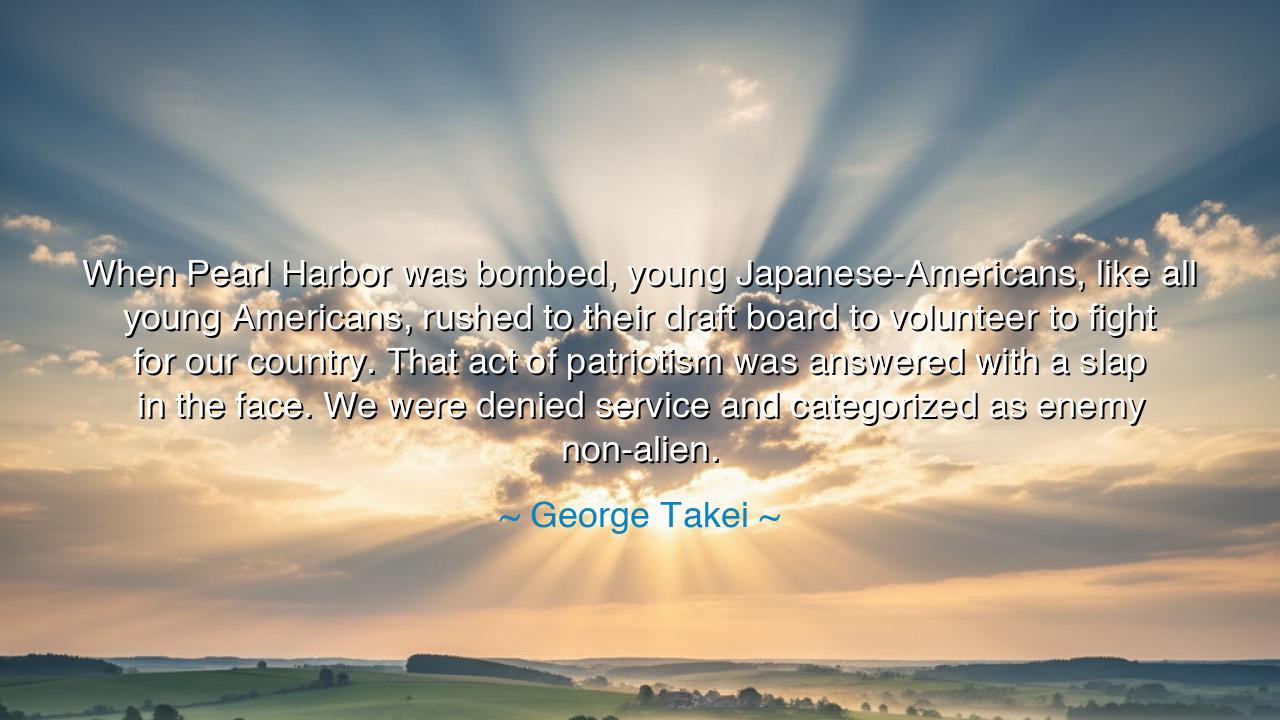
When Pearl Harbor was bombed, young Japanese-Americans, like all
When Pearl Harbor was bombed, young Japanese-Americans, like all young Americans, rushed to their draft board to volunteer to fight for our country. That act of patriotism was answered with a slap in the face. We were denied service and categorized as enemy non-alien.






The words of George Takei—“When Pearl Harbor was bombed, young Japanese-Americans, like all young Americans, rushed to their draft board to volunteer to fight for our country. That act of patriotism was answered with a slap in the face. We were denied service and categorized as enemy non-alien.”—carry the weight of both sorrow and courage. They are the voice of one who lived through betrayal, who saw loyalty met with rejection, and who endured injustice while still proclaiming love for the land of his birth. In his words we hear the eternal struggle between the nobility of the human spirit and the blindness of prejudice.
In December of 1941, when Pearl Harbor was struck, the United States was thrown into the fires of war. Young men across the nation rushed to enlist, eager to defend their country. Among them were thousands of Japanese-Americans, children of immigrants, born beneath the American flag, raised in its schools, and devoted to its ideals. Their response was immediate, selfless, and patriotic. They sought not privilege, but service; not exemption, but sacrifice. Yet the hand they extended in loyalty was struck aside. The government branded them not as citizens, but as enemy non-aliens, a cruel phrase that stripped them of dignity and cast them into suspicion.
This injustice culminated in the internment of over 120,000 Japanese-Americans, many of them uprooted from homes, farms, and businesses, and sent to bleak camps behind barbed wire. They were guarded not for crimes committed, but for ancestry they could not change. In this, Takei’s memory burns bright: the act of patriotism was met not with honor, but with exclusion. The very nation they sought to defend wounded them deeply, showing how fear and prejudice can corrupt even the most sacred ideals.
Yet from this darkness emerged a story of unyielding loyalty. Denied enlistment at first, many Japanese-Americans later fought in the segregated 442nd Regimental Combat Team, which became the most decorated unit for its size and length of service in U.S. military history. These soldiers, many with families imprisoned at home, charged into battle in Europe with unmatched courage. Their motto was “Go for Broke,” and their sacrifice proved that true patriotism is not destroyed by injustice. They fought not for the government that wronged them, but for the ideals of freedom and democracy that they still believed America could one day embody.
Takei’s words remind us that the measure of a nation is not only in how it treats its heroes, but in how it confronts its mistakes. The betrayal of Japanese-Americans was a scar upon the promise of liberty, yet their response revealed the resilience of the human spirit. Their patriotism was greater than the prejudice they faced, for it was not dependent on recognition or reward. It was rooted in hope for a better future, for a country that could rise above its failings.
The lesson for us is profound: never allow fear or prejudice to blind you to the loyalty and humanity of others. Beware the temptation to judge a person by ancestry, appearance, or creed. True patriotism does not exclude—it unites. It does not brand its children as enemies—it calls them into fellowship and honors their service. A nation that betrays its own weakens itself, but a nation that embraces all who are willing to serve grows strong beyond measure.
In daily life, this means standing against discrimination wherever it appears, guarding the dignity of all people, and ensuring that loyalty is met with trust, not suspicion. It means remembering the stories of those who suffered injustice, so that history does not repeat itself. And it means expanding our definition of patriotism, seeing it not as uniformity, but as the courage to serve and the devotion to ideals greater than ourselves.
Thus let Takei’s words echo in our hearts: patriotism met with betrayal still shines brighter than fear. The young Japanese-Americans who volunteered proved that loyalty can endure even when unrecognized, and that the true strength of a nation lies in honoring all who love it. May we learn from their sacrifice, guard against prejudice, and ensure that no act of devotion is ever again answered with a slap in the face.






AAdministratorAdministrator
Welcome, honored guests. Please leave a comment, we will respond soon